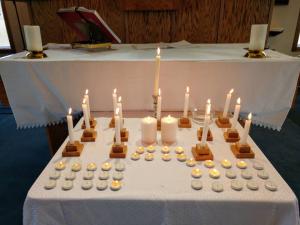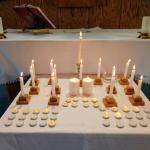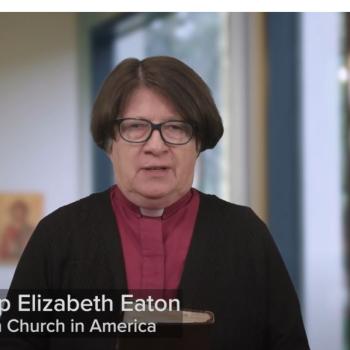As expected, the 2018 midterm elections were a mixed bag for both political parties in the U.S. Depending on where you live and your party affiliation, you are likely either celebrating, or bitterly disappointed, or some combination of both. However, if you’re a Christian – and especially a minister – knowing Sunday morning’s service is just ahead may be creating an even higher level of angst. This is because churches are increasingly becoming flash points of political clashes among members or between members and clergy.

As a seminary professor of preaching and worship, I’m hearing more and more stories of parishioners engaging in heated exchanges with each other or their pastor over any number of issues, including race, positions on the abortion debate, immigration, and gun violence, to name just a few. The tension clergy leaders and church members are feeling these days can make it difficult to hold together as the Body of Christ, whether it’s sharing a pew, partaking in communion, or doing the work of committees and councils.
“How are we supposed to be the church in a time like this?”
“How are we supposed to go into our churches on Sunday morning? What are we supposed to say and do? How can we face those who are going to gloat over this election victory? How are we going to endure the pain of those who are alarmed by the outcome? What does it look like to be church in the midst of all this?”
These are the kinds of questions ministers and parishioners may be asking.
As I’ve been working on my book Preaching in the Purple Zone: Ministry in the Red-Blue Divide (coming out in April 2019 from Rowman & Littlefield), I’ve been asking these questions, too. Over the past two years, I’ve researched how preachers approach controversial issues in their sermons, and worked with clergy on ways to navigate the Purple Zone while proclaiming the gospel with integrity and pastoral prudence. As you’re thinking about this coming Sunday – or any Sunday after a volatile political election – here are some things to keep in mind for being a Christian in the midst of a fractured and divided society.
1. Ensuring people’s safety is top priority.
Given the rhetoric of the person who occupies the White House, and given the fact that 14 pipe bombs were intended prominent politicians and members of the media, and several hate-crime-based mass murders occurred just prior to the election, a significant portion of this country is experiencing alarm and legitimate fear about their physical and emotional safety, or for their family members, friends, students, or co-workers. Women, people of color, Jews, Muslims, immigrants and their children, and people of differing sexual orientations, and children in schools, are among those who are worried about their safety during this volatile time.
So if you are a pastor or leader of a congregation, it must be clearly stated that no kind of hateful rhetoric will be tolerated in God’s house of worship. The church is called to be a place of refuge. If you are a Christian, you are part of the Body of Christ, which means that you are to refrain from that kind of talk – even outside of the church. You represent Christ in the world. Behave in a manner that reflects the One whom you worship.
2. If you are a Christian (including a pastor) who is celebrating the results of this election, do not gloat. Now is the time for restraint.
This is not like the Sunday after the World Series or the Superbowl where the victors can good-naturedly rib the losers. For those whose candidates were defeated, there is existential angst based on real or perceived threats to their safety, economic stability, health, and general well-being. The church must be a place to shore up the basic foundations of decency, respect, and the means by which to preserve the common good.
3. Be cautious about insisting that people need to “come together.” Avoid using words like “unify” and “move on.”
For those who are living with the effects of toxic rhetoric that authorizes homophobia, misogyny, anti-Semitism, xenophobia, gun violence, sexual violence, racism and white privilege, hearing an urge to “come together” with someone who has supported those positions is insensitive at best, terrifying at worst. Being a Christian during this time may require space-giving. Eventually we will need to talk about where we go from here. But understand that this is a time of grief and fear for many. Reach out and check in with people. But avoid urging them to engage with people or situations that may feel threatening or harmful to them.
4. It’s okay for parishioners to take a break.
Some people may not even feel comfortable going to church this Sunday if they cannot bring themselves to face what they fear will be the triumphant jeers of their fellow Christians. That is perfectly understandable. Take the time you need. Let the dust settle. When you’re ready to come back, do so in your own time.
5. But if you are a pastor, you don’t have the luxury of absence.
Remember that the day after the crucifixion, the women did something that we as clergy need to do. They showed up. The women were confused, angry, anguished, and in deep grief. But they went to the tomb because they were faithful. They went to perform the rituals – the sacred actions and words – that were part of their people’s faith for centuries. We, too, are called to show up. We are called to be faithful and perform the sacred rituals that give meaning and stability in uncertain times.
6. Times like these are exactly why we are called to be Christian, to preach, to minister.
While it’s understandable that you may be feeling trepidation heading into Sunday morning, remember that this is precisely the time when clergy are needed. “For such a time as this,” as Mordechai said to Esther when she faced an uncertain outcome in representing her people to the king. In other words, we are ideally situated as people of faith to step into this tension. After the resurrection, Jesus told the women to convey the message: “He has already gone ahead to Galilee to meet you,” (Mark 16:7). The Spirit is already at work in ways that may not yet be evident. So we are called to be a calming presence and to use all of our skills of reflective listening, empathy, and active attention.
7. Lean into the liturgy and worship.

The church has the advantage of ancient actions and words – rituals – that are designed to hold the vast range of feelings experienced by the congregation. Rely on that pattern of worship that is so ingrained in us: gathering, hearing God’s word, breaking bread and sharing wine, and sending out into the world. Let the liturgy minister to you and your congregation. Let it gather in all who will come. Offer prayers for healing. Set up a table with candles for people to light as symbols of their concerns or prayers. Reassure the congregation that the Spirit of God through the compassion of Jesus Christ is in our midst.
8. God is at still at work.
If you’re a Revised Common Lectionary preacher, you know that the texts this coming Sunday focus on the Widow of Zarephath (1 Kings 17:8-16) and the Widow bringing her small offering to the Temple in Jerusalem (Mark 12:38-44). In both stories, there are intense political divides between religious leaders, political leaders, and different tribes – just like there are today. But exacerbating all these divides in scripture as well as in our time is the disparity between those who control the community’s wealth and those who do not. Economic violence is the problem undergirding many of our political tensions.
In the midst of this, God puts the widows front and center.
The ones who are poor, who have no social safety net, who are cast aside by economic systems that prey on them – even as their leaders parade about in rich clothing. So no matter how these midterm elections turned out, God is still calling us to pay attention to the poor, the lost, the forgotten, the disenfranchised, the victims of economic violence.
9. Our work remains.
Regardless of the results of the midterm elections, the rich are still parading in their robes. The widows remain. They still have only a jar of flour and a jug of oil. They still have only two coins. And Jesus is still watching. When everyone else is distracted by the big goings-on among the power-brokers, it’s Jesus who points out the widow. It’s Jesus who draws attention to a system that leads to this level of destitution and desperation – even as she tries to be faithful. Let’s pull up a chair alongside Jesus and follow his gaze to see who he is paying attention to. And then let’s get to work to address those systems of economic violence.
Elections come and go. The work for the church remains.
[Looking for sermon ideas for Sunday? Check out this blog piece by Lisa Cressman at Backstory Preaching.]

Leah D. Schade is the Assistant Professor of Preaching and Worship at Lexington Theological Seminary (Kentucky) and author of the book Creation-Crisis Preaching: Ecology, Theology, and the Pulpit (Chalice Press, 2015). She is an ordained minister in the Lutheran Church (ELCA). The views expressed here are her own and do not represent the institutions she serves.
Twitter: @LeahSchade
Facebook: https://www.facebook.com/LeahDSchade/.
Read also:
It’s Time to Vote and THUNDER at the Polls: Rev. Dr. William Barber Visits Kentucky
Bringing Our Faith to the Ballot Box: All Saints Sunday Sermon













